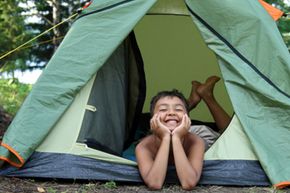There are camps focused on every pastime-ones for junior basketball buffs and half-pint horse lovers, fishing fanatics, wrestling enthusiasts, and kids who are into magic, chess, photography, dance, or any of a host of other hobbies. But despite the ostensible draw of constant entertainment and a bevy of new friends, the transition away from the familiar home environment to an unknown camp atmosphere-especially to a resident "sleepaway" camp-isn't always fun and games.
Your job as a parent has just begun if you've identified the best summer place for your child. The next all-important goal: to soften his or her transition into camp-offered independent exploration and psychological growth.
Advertisement
Looking Forward to Fun
To ease a potentially traumatic separation from family and help ensure that your child is a happy camper, consider these tips from the American Camp Association (ACA), promoter of quality camps, including day, resident and special-needs varieties:
- Make camp-related decisions together with your children. Let kids participate as much as possible in camp planning,-such as where to go and what to take. "The more you can familiarize your kids with the experience ahead-of-time, the less scary it will be," points out Peg Smith, CEO of the ACA.
- Keep expectations realistic-ups and downs included. Talk about the fun-filled times that your child can expect to have at camp, emphasizing the goals of enjoyment and relaxation, not success. But don't forget to acknowledge the possibility of some unhappy periods, too.
- Convey confidence in their coping ability. Encourage children to talk about any nervousness related to going away, and express trust that they can get through any separation pangs that plague them.
Advertisement
